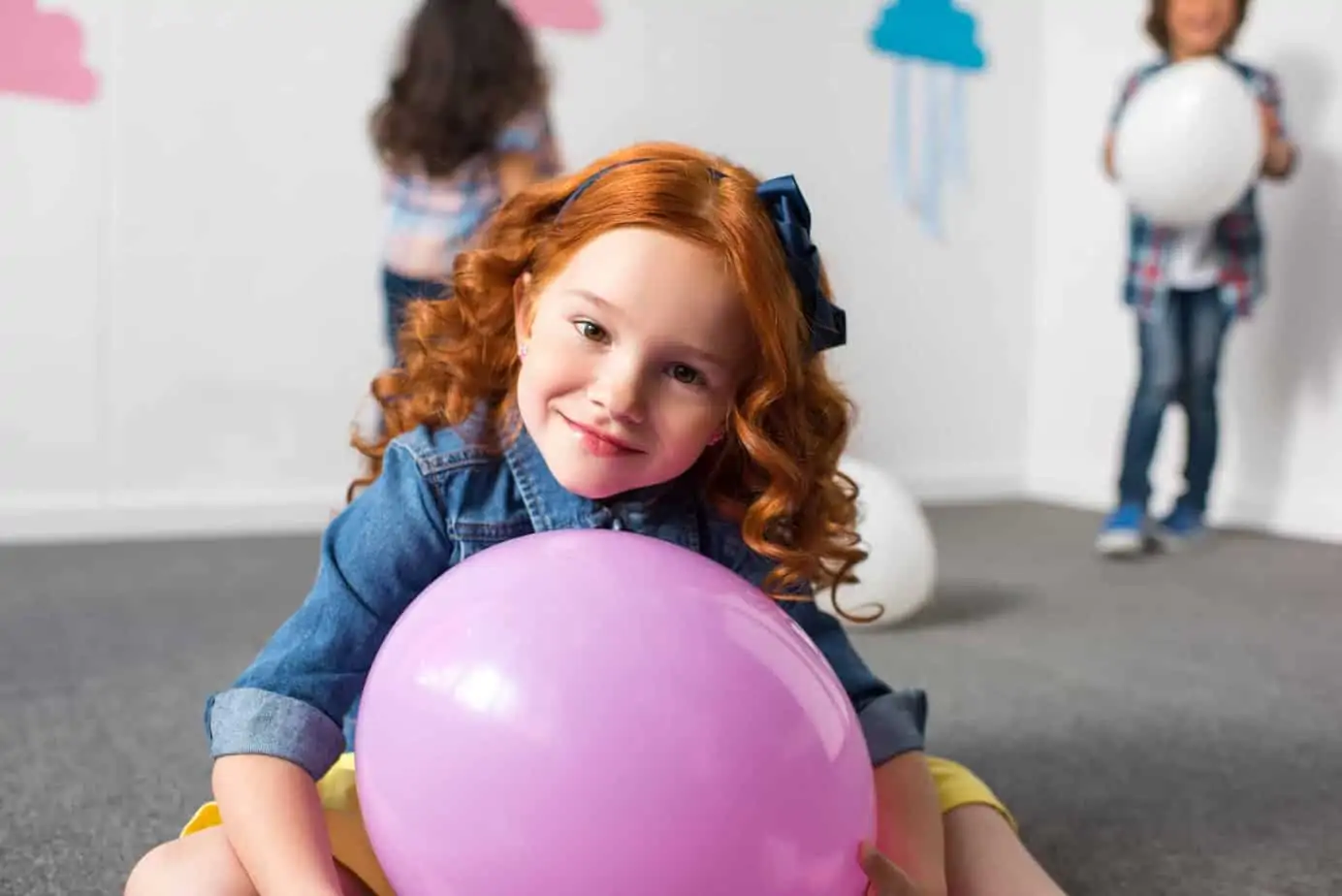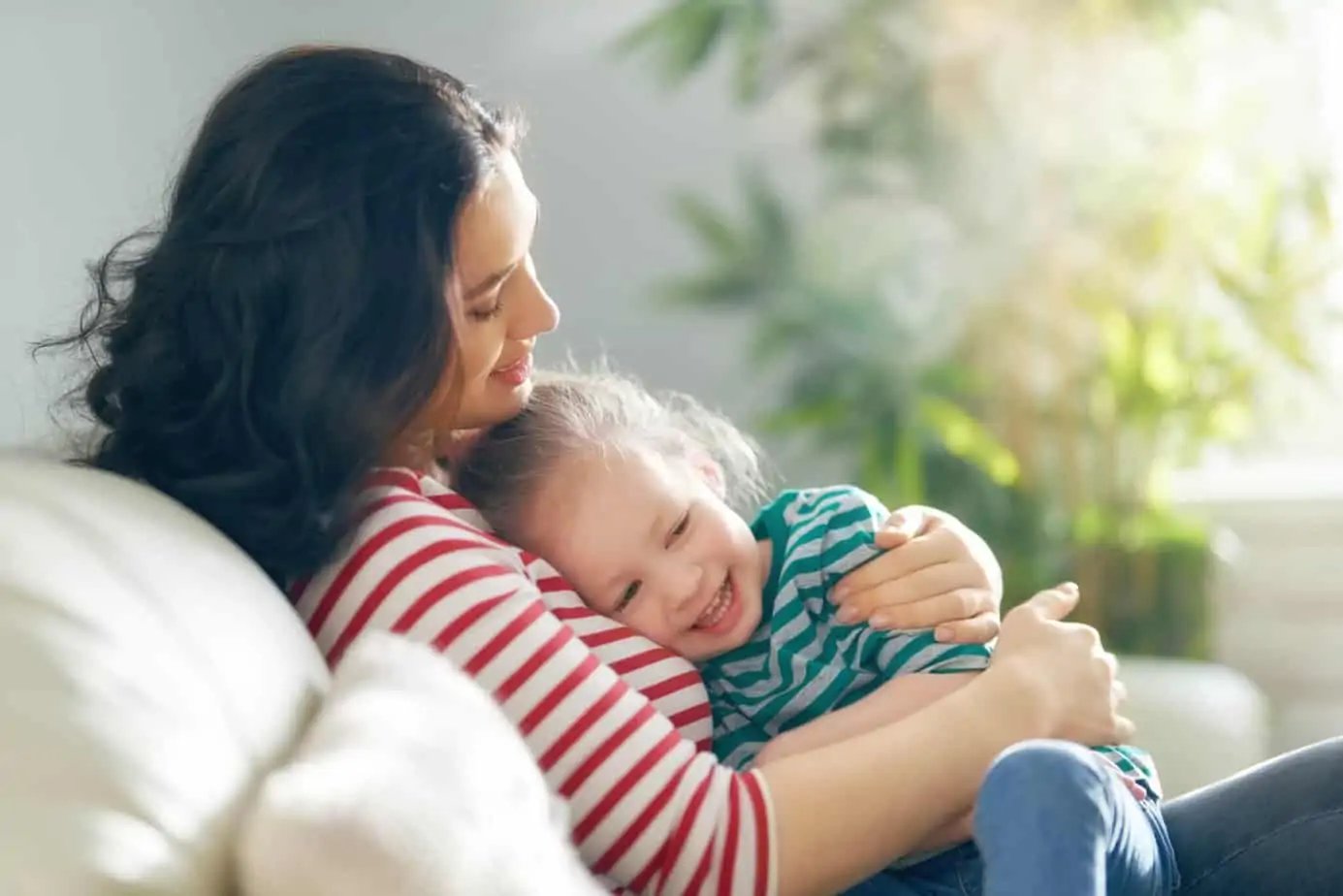Negative language impacts kids; it creates confusion and makes them feel discouraged they can’t do anything right. The solution? Using positive language to gain cooperation and have a positive relationship.

I was moving around the kitchen trying my best to round up dinner with limited ingredients. My husband was working late which meant I was solo for both dinner and bedtime, having barely made it through the after-school explosion of energy and couch surfing.
I was throwing noodles in a pot of boiling water and finishing up dicing vegetables, knowing full well there was less than a 50% chance my kids would eat them.
While I was trying not to burn anything, the kids were in the living room within eye-sight, although my parenting was side-line referee at best.
I was being a lazy couch parent, you know when you’re aware of what’s going on, but not actively parenting except for the times you throw out directives or worse, empty threats, like…
“Stop running in the house.”
“Stop picking on your sister.
“Stop jumping on the couch.”
“Don’t throw your toys.”
“Stop poking her.”
“No more name calling!”
“I SAID STOP IT!!!”
The back and forth went on for nearly 10 minutes before I left my post in the kitchen, having just pulled a pan of cooked chicken off the stove, to finally stop my son in his tracks and tell him in a fierce voice to “KNOCK IT OFF!”
He looked at me undeterred, turned on his heels and headed in a direct path towards the playroom.
It struck me that he didn’t miss a beat when I told him to stop and was already setting his sights back to tormenting his little sister.
I was at a loss. It was clear I wasn’t getting through to him. He wasn’t in the least bit phased by my stern tone of voice or hands on the hips Mom pose. In fact, I was more rattled than he was about raising my voice.
Then I had a light bulb moment.
I’ve been doing my best at trying to follow the guidelines of positive parenting, but this wasn’t positive parenting at all.
Not even a little.
What I was doing was barking commands from the kitchen without enforcing limits, and my voice wasn’t calm or respectful.
What I was doing was permissive parenting, the exact opposite of positive parenting.
To add fuel to the fire, I was also using words with negative connotations – stop, no, don’t, knock it off, etc.
I was responsible for creating an unhealthy environment with the way I spoke to my kids and if I wanted things to change, it had to come from the top down – me.
THE ENVIRONMENT YOU CREATE WITH LANGUAGE
Researched shows how negative language impacts children – particularly how much confusion it creates, the internal resistance this stirs inside of them and how continued negative language makes children feel discouraged they’re always doing something wrong or “being bad.”
Negative wording is hard for children to understand because they don’t know what you want them to stop doing and what to do instead.
It’s also discouraging to be told “no,” “stop,” “don’t” all the time, and can even make children feel like there is no point in trying to do right.
The solution? Use positive language.
Positive language clearly shows children what you want them to stop doing and what you’d like for them to do instead, in a gentle way. There’s no confusion of your expectations of their behavior.
When you put more thought into your reactions, you give children clear guidance, without making them confused or feel bad about themselves.
Defaulting to negative language, is like asking for power struggles, back-talk, tantrums, and our children likely not listening and ignoring us.
CONFUSING LANGUAGE
Using certain words are confusing for kids because they don’t tell your child what you want them to do.
For example, telling your child to “Stop” doesn’t give clear directions, other than letting the child try to find on their own what they should and shouldn’t be doing. Little kids like toddlers and preschoolers don’t have this level of thinking yet, so telling them to stop is pointless because they can deduce what you want them to “stop” doing just from the word alone.
What it comes down to is being specific about what we’d like our children to stop doing, and what we’d like them to do instead. This removes the confusion and gray area left open for interpretation by your child about what they are doing wrong and what you want them to do instead.
Instead of saying, “stop” or “no,” phrase the statement like this:
- Uh oh, we don’t throw sand. Let’s use our shovel to scoop it up instead.
- Our hands aren’t for hitting, we can put them in our pockets or clap them when feel like they might hit.
- Let’s walk in the house, if we run, we can get hurt.
- Can you please bounce the ball outside instead of in the house?
Removing the guess work, gives your child a clear direction of what they should be doing without using negative wording.
BRINGING CHANGE TO OUR HOUSE WITH POSITIVE LANGUAGE
That night I grabbed two pieces of paper and a black sharpie and wrote down a list of words and phrases that were being banned from our house.
Negative words and phrases on the list:
- Stop
- No
- Don’t
- Knock It Off
- Don’t do That
- Stop It
- Leave _____ Alone
- Cut It Out
- Why Aren’t You Listening
- Don’t Run
- Don’t Hit
- Stop Jumping on the Couch
On the other piece of paper, I wrote alternatives to these negative words and positive phrases to use instead. I taped the pieces of paper side-by-side on the kitchen cabinet where I could see them most throughout the day.
Honestly, the first few days of using positive language was hard. I didn’t realize how many times I used the word No, or Stop. When I observed my children interact with each other, I saw this reflected in the way they spoke to one another, too.
They were using negative language just as much as I was. It was clear we were all due for a big change!
Then the magic started.
Once I started using positive language, it started to become a natural habit and no longer something I had to think about before I reacted to the kids running in the house, or fighting over a toy.
My children also began to talk to each other more nicely, and everyone’s behavior started to shift.
EXAMPLES OF CHANGING NEGATIVE TO POSITIVE LANGUAGE
- Stop running –> Please walk
- No jumping on the couch –> Please sit on your bottom on the couch
- Don’t cut your hair –> Scissors are for cutting paper
- Don’t touch your sister –> Do keep your hands to ourselves
- Don’t take her toys –> Can you please find something else to play with until she’s done?
- Stop yelling –> Please use your inside voice
- No throwing balls in the house –> You can take the ball outside to play if you’d like
- Stop Whining –> Please use your words so I can hear you
- No hitting –> Please use gentle hands
- Don’t even think about running, I’m watching you! –> I’m so glad to see you remembering to walk safely down the hall
- Don’t climb on the table –> Please keep your feet on the floor
- Stop throwing sand –> Would you like to fill this bucket with sand?
POSITIVE REDIRECTION WHEN YOU RESPOND
When you speak with your kids about their behavior and give them direction on what you’d like them to do instead, give them a clear and positive alternative, such as:
- You can play the game outside
- Please take the ball outside
- You can play gently with each other
- Finding a way to say ‘yes,’ goes a long way. For instance, instead of answering, “No you can’t have a cupcake now,” saying, “After dinner, you can have a treat,” is much easier to digest. The message is different, the outcome the same.
LITTLE TRICKS TO CHANGE TACTICS & PARENT POSITIVELY
- If a friend or family member were watching how you parent, what would you think of this? Would you act different? Imagine someone by your side before you react to your child and respond as if you were being graded on your positive parenting skills.
- Say your request while you’re engaged with your child and getting down to their level undistracted, will keep you from permissively parenting from the sidelines.
Need a little extra handling your child’s big emotions? Here’s a FREE Parenting Course to help you both turn things around.
WANT MORE?
- 7 Ways to Help Kids Identify Feelings & Control Emotions
- Why Kids Whine & How to Stop It (Tips from 8 Professionals)
- Consequences for Kids: Why Some Work & Others Never Do
- How to Create a Positive Home (And Why this Will Affect Your Kids Forever)
- 9 Ways to Build Your Child’s Confidence
- Stop Saying “Good Job” and What to Say Instead
Want even more?
Shop All Parenting Resources
Shop all of our parenting resources from self-regulation tools and managing big emotions to building self esteem and confidence. There are resources for all seasons of life!









This article is amazing. Simple and straightforward,providing examples for the “every” mom out there. I’ve read many parenting tip articles and none have resonated quite this well. A lot of articles seem to be cut and pasted, out of text books. Your past verbal communications are very similar to others, but some don’t want to admit it. It’s a failure, and it becomes an easy denial, by not discussing it, you only hide the problem and truly will never fix it. and life takes hold, you want to change and think where do I start? you formulated a fix that is simple yet effective that every parent can do. This is an article that you can tell a true parent wrote, and is being sincere. I immediately took paper and sharpie In hand and did as you did. I was shocked how true it is- the bad words were bad BUT the good words meant change and A light I haven’t seen in awhile. I now see what I’ve been doing wrong, and saying wrong and the impact that it has on my child. Thanks so much for the advice